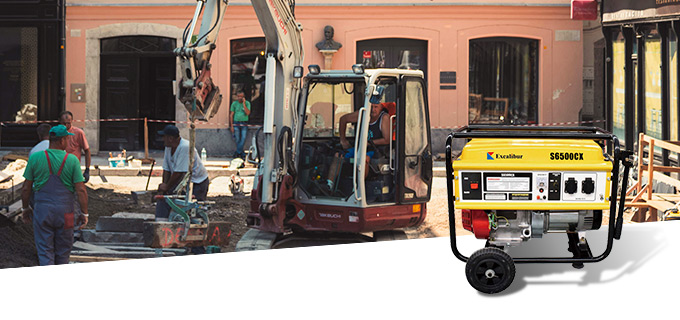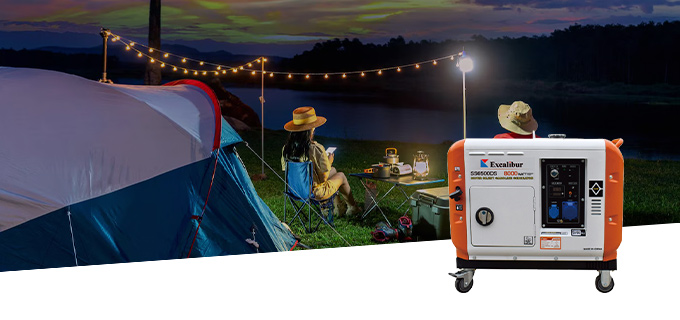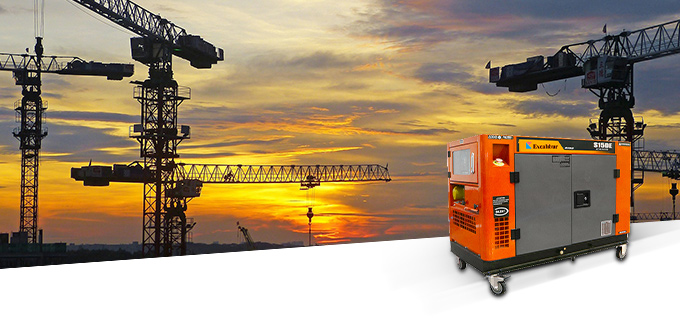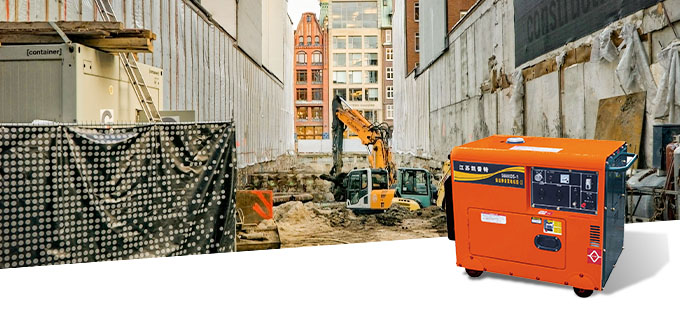When selecting a generator for your home, business, or industrial facility, it’s essential to understand the various factors that influence the suitability of a generator for your specific needs. A well-chosen diesel generator can provide reliable power, cost savings, and peace of mind during outages or in off-grid situations.
How to Choose Generator for Residential?
For most homeowners, a diesel or gasoline generator will be the most practical choice for backup power. Diesel generators offer excellent fuel efficiency and durability, making them well-suited for long-term use. Gasoline generators are more budget-friendly and portable, making them a good option for occasional or temporary use.

Identify essential appliances
First, create a list of the crucial appliances and systems that must remain powered during an outage. Common essential appliances include:
- Refrigerator/Freezer
- Lights
- Heating or air conditioning systems
- Water heater
- Microwave
- Television
- Computers and chargers
- Medical devices
Determine the wattage of each appliance
First, determine the wattage of each appliance in your home. This information is usually found on appliance labels. If it’s not specified, you can calculate the watts using this formula:
Wattage (W)=Voltage (V)×Amperage (A)Wattage (W)=Voltage (V)×Amperage (A)
Here’s a list of approximate wattages for common household appliances:
- Refrigerator/Freezer: 600 – 800 W
- Microwave: 800 – 1200 W
- Lights: 60 – 300 W (depending on the type and number of bulbs)
- TV: 100 – 400 W
- Computer: 100 – 300 W
- Electric Stove: 2000 – 5000 W
- Air Conditioner: 1000 – 4000 W
- Furnace (Fan): 500 – 1500 W
- Water Heater: 3000 – 4500 W
Calculate total wattage
Sum the wattages of all the appliances you need to power at the same time. This total represents the starting point for determining the generator size. Remember to account for appliances with higher starting wattages, such as those with motors or compressors.
Consider surge wattage
Some appliances require more electricity to start than to run continuously. This surge wattage is essential to consider when sizing your generator. Ensure your generator is capable of handling the initial wattage requirements of all your appliances.
Choose generator with adequate capacity
If your total wattage requirements exceed your expected load, choose a diesel generator with a capacity larger than that. Ensure the generator you select can handle both the continuous and surge loads of your appliances.
Consider generator features
In addition to capacity, consider other features of the generator that may be important for your needs:
- Automatic Transfer Switch (ATS): An ATS automatically switches your home to generator power during an outage, ensuring a seamless transition.
- Selecting a generator with a high fuel economy will help you reduce your continuous operating costs.
- Noise Level: If the generator will be positioned near your home, pay special attention to how loud it will be. Some diesel generators are designed for quiet operation.
- Portability: If you need a portable generator, consider the size and weight for ease of transportation.
How to Choose Generator for Business?
In order to guarantee a dependable power source during blackouts or emergencies, businesses must carefully evaluate a number of important elements when selecting a generator.
Assess your power needs
Identify Critical Systems: Determine which equipment, systems, and processes are critical for your business operations. This may include computers, servers, communication systems, manufacturing equipment, refrigeration units, and lighting.
Calculate Power Requirements: Determine the total wattage or kilowattage needed to power all essential equipment simultaneously. Take into account both the running wattage and the starting wattage (if applicable) for each device.
Consider generator size and capacity
Select the Appropriate Size: Choose a generator big enough to meet all of your needs for power.
It should be capable of handling both the continuous load and any surge demands from starting equipment.
Factor in Future Growth: Consider potential expansion or increased power needs in the future. Select a generator with extra capacity to support future growth, eliminating the need for an upgrade.
Select the fuel type
Diesel, Gasoline, or Natural Gas: Decide on the most suitable fuel type based on factors such as availability, cost, and operational requirements. Diesel generators are commonly chosen for their fuel efficiency and reliability, while gasoline generators may be more cost-effective for smaller operations. Although they are more convenient and produce less pollution, natural gas generators might need a dedicated gas supply.
Consider generator features and technology
Automatic Transfer Switch (ATS): An ATS automatically detects power outages and switches the generator on, ensuring seamless power transfer to critical systems without manual intervention.
Remote Monitoring: Using a computer or mobile device, you can remotely monitor certain generators’ performance, fuel levels, and maintenance requirements.
Sound-Attenuating Enclosures: If noise is a concern, consider generators with sound-attenuating enclosures or mufflers to minimize noise levels, especially in urban or noise-sensitive areas.
Evaluate maintenance and support
Maintenance Requirements: Consider the maintenance needs of the generator, including oil changes, filter replacements, and routine inspections. Opt for a generator with accessible service points and straightforward maintenance procedures to reduce downtime.
Manufacturer Support: Research the reputation of the generator manufacturer and their track record for reliability, warranty coverage, and customer support. Select a reputable manufacturer known for delivering quality products and offering responsive support services.
Ensure compliance and safety
Local Regulations: Ensure the generator complies with local regulations and codes regarding emissions, noise levels, installation requirements, and safety standards.
Safety Features: Seek out safety features like overload protection, circuit breakers, and automatic shutdown systems to guard against electrical hazards and equipment damage.
Budget considerations:
Initial Investment: Consider the upfront cost of purchasing and installing the generator, including any additional equipment or accessories needed.
Total Cost of Ownership: When assessing the total cost of ownership over the generator’s lifespan, consider ongoing expenses such as fuel, maintenance, repairs, and insurance.
How to Choose Generator for Industrial Facility?
Choosing a generator for an industrial facility is a crucial decision that demands careful evaluation of multiple factors to ensure uninterrupted power supply and operational reliability.

Assess power requirements
Identify Critical Systems: Determine the critical equipment, machinery, and processes that require uninterrupted power supply to maintain operations. This may include motors, pumps, compressors, HVAC systems, lighting, control systems, and data centers.
Calculate Total Power Load: Calculate the total power demand of all critical systems, including both the continuous power requirements and any surge demands during startup. Consider the power factor and efficiency of industrial equipment when estimating power needs.
Select the right capacity
Choose Adequate Capacity: Select a generator with sufficient capacity to meet the total power load of your industrial facility. Ensure the generator can handle both the steady-state load and any transient loads from starting motors or equipment.
Factor in Future Expansion: Consider future growth or expansion plans for your facility. Choose a generator with additional capacity to accommodate increased power demands as your operations expand.
Consider fuel type
Diesel, Natural Gas, or Biogas: Evaluate the pros and cons of different fuel options based on factors such as availability, cost, emissions regulations, and operational requirements. Diesel generators are favored for their reliability and fuel efficiency, while natural gas generators provide cleaner emissions and lower operating costs in certain regions.
Evaluate Generator Features
- Automatic Start/Stop: Opt for generators with automatic start/stop functionality to ensure seamless power transfer during outages or emergencies.
- Load Management: Consider generators with load management capabilities to prioritize critical loads and optimize fuel efficiency during operation.
- Remote Monitoring: Choose generators with remote monitoring and diagnostic capabilities to track performance, monitor fuel levels, and receive real-time alerts for maintenance or issues.
Assess Environmental and Safety Considerations:
Emissions Compliance: Verify that the generator conforms with regional emissions laws and ecological guidelines. Choose generators with advanced emission control technologies to minimize pollution and environmental impact.
Evaluate Maintenance Requirements:
Scheduled Maintenance: Take into account the generator’s maintenance needs, such as regular inspections, oil changes, and filter replacements.
Select generators with accessible service points and simple maintenance procedures to reduce downtime and maintenance costs.
Budget Considerations:
Initial Investment: Evaluate the upfront cost of purchasing and installing the generator, including any necessary infrastructure upgrades or installation expenses.
Conclusion
When choosing a diesel generator, it’s important to take your power requirements, generator size, power output, and other aspects like noise, pollution, and maintenance into account. Investing in a high-quality diesel generator can offer peace of mind, knowing you have a dependable power source ready whenever you need it.




